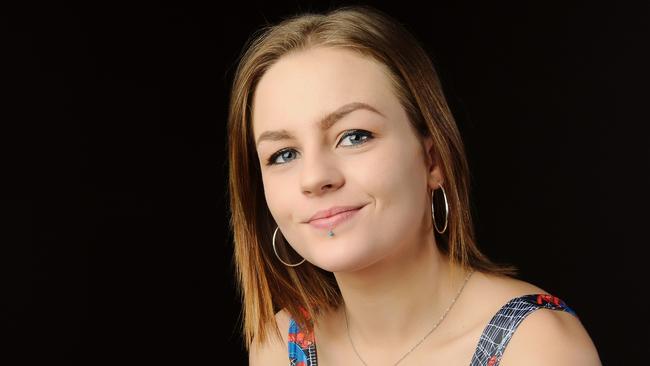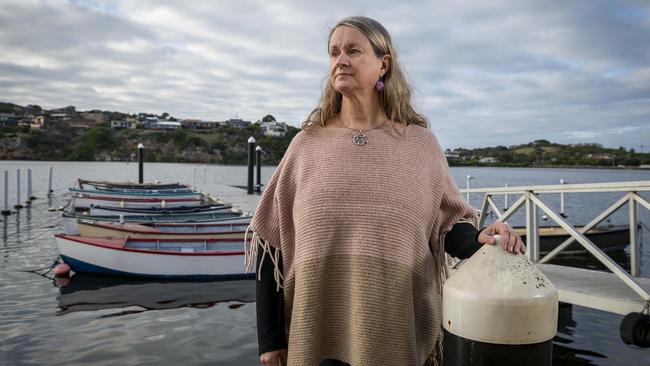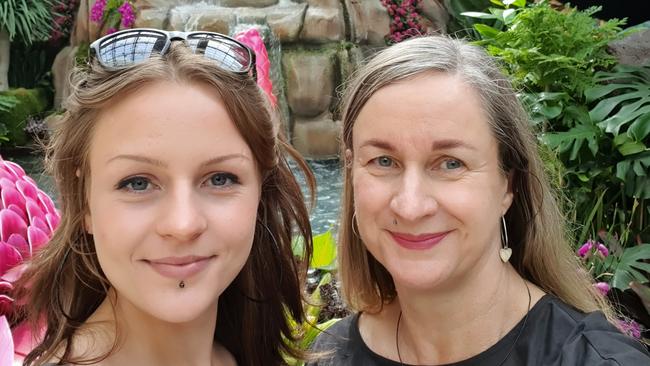Sickening abuse, but husband collects Molly Wilkes’s $65,000 super after her suicide
When 22-year-old Molly Wilkes took her own life two years ago after years of degrading abuse at the hands of her husband she could not have known that her tormentor would become the principal beneficiary of her death.

When 22-year-old Molly Wilkes took her own life two years ago after years of degrading abuse at the hands of her husband she could not have known that her tormentor would become the principal beneficiary of her death – including a $65,000 superannuation payout.
Molly had left her home in Perth to live in Las Vegas with her former boyfriend, who had gone to the US for work. They married not long after, but their relationship quickly became toxic.
Molly can no longer speak for herself, but the torrent of rage and abuse the young woman suffered at the hands of her husband is recorded in his texts, recovered from her phone.
Ugly cheating whore
Useless c...
Loser
Stupid
F..king sook
Dig a hole and bury yourself in it you pathetic c...
Hundreds of obscene messages, demeaning and relentless.
Molly’s mother, Julie Adams, says: “He made her life so unbearable, so miserable, and she was so exhausted from just trying to stay alive each day that she ended her own life.”
Julie has spent nearly two years trying to stop her son-in-law collecting her daughter’s superannuation and life insurance benefits, but to no avail.

As her legally married spouse, he was entitled to the money.
In December super fund HESTA paid him the whole amount.
He has never been charged with any offence.
But under the current law even if an “eligible dependent” has been charged and convicted of a domestic violence offence he would still be eligible for the payout.
“Unfortunately, the trustee can only intervene in situations such as this where an eligible dependant has been (or is likely to be) formally charged with a member’s murder,” HESTA told Julie.
That astonishing loophole has spurred the grieving mother to push for change.
Julie wants it to become impossible – or at least more difficult – for a domestic violence perpetrator to walk away with their partner’s superannuation after a suicide linked to their abuse.
Her submission to a parliamentary inquiry into financial abuse, lodged this week, begins: “My beautiful, feisty and kind 22-year-old daughter, Molly Jane Wilkes, died from domestic violence-related suicide in July 2022.”
Murder threat
Molly grew up in Perth. Her teenage years were blighted when she was sexually abused and introduced to drugs by an adult family acquaintance when she was 14.
While still a teenager she began a relationship with the man who would become her husband, but when he moved to the US in January 2020 the relationship faltered. Molly began seeing another man. Friends say she seemed happy.
But when Molly was granted an exemption to leave Australia during Covid, her ex-boyfriend bought her a ticket to the US. Molly flew to visit him in November 2020 on a 90-day visitor’s visa. Two months later they married in Las Vegas.
Molly told none of her siblings or friends that she’d got married, and posted no photos or hints of the wedding on social media.
The couple lived in his rented house, a unprepossessing stucco-sided three-bedroom home on the southwest outskirts of Las Vegas, just before the city gives way to desert. He was often away, working out of town. Molly wasn’t able to work or study on her visa and had no income.
Her mother would send her money. Julie says Molly told her that her husband was very controlling financially, abusing her on one occasion for spending money on a packet of gravy and a bus fare.
“She would say to me: he’s left me no money to buy tampons or toilet paper and things like that.”
In obscenity-strewn messages, seen by The Weekend Australian, he told Molly she was a drain on his finances, and urged her to try to access her inheritance from her grandmother.
Other messages are simply streams of abuse.
You f..king retard
Your (sic) so f..king pathetic
Loser
Junky
Stupid
Cheating
Whore
Lying
F..king sook
Get your ticket and leave
Another:
Unloyal cheating c...
Get the f..k out of my house by the time I’m home
C...
On one occasion he appears to refer to the sexual abuse she experienced as a teenager, making reference to being a “crack addic (sic) by the age of 14” followed by laughing emojis and “Have fun”.
Molly tells him: “Your bringing up my past trauma is f..ked. I was 14. I was being manipulated.”
“Your (sic) f..ked,” he responds.
In the last weeks of her life, the obscenities turned to threats.
In one message he tells her: “I am going to f..king murder you and spend the rest of my life happily in jail.”
Tormenting Molly
Julie Adams was becoming increasingly worried about her daughter.
In her submission to the Senate inquiry, Julie says Molly tried to leave her abuser six times after they married in January 2021, and in the week before her death had packed her bags and was ready to leave. “During the relationship Molly experienced severe emotional, sexual, physical and financial abuse,” Julie says.
“However, once he found out about her plans, his emotional torture and manipulation of her escalated. Exhausted, and completely isolated in a foreign country, she did not have the energy to leave.”
In July 2022, Julie received phone calls from a highly distressed Molly, saying she needed to leave Vegas and come home. She believed her husband was having a sexual relationship with another woman. He had by then been working away from home for about two months, with occasional weekend trips home.
Text messages from this time show him tormenting Molly, saying that he was having a relationship with the woman he had met.I’m f..king her she’s in my bed right now. Going to have a cute brekky date, I’ll send you some photos.
Julie says she spoke to Molly many times over the next few days, as she planned to leave her husband and the US.
Julie says Molly knew that the most dangerous time for a woman was when she was leaving her abuser.
“She always had a backpack with her passport and other necessary items packed in a cupboard, to assist her exit in an emergency,” Julie says.
On the evening of July 28, Julie called Molly but couldn’t reach her. When her daughter still wasn’t answering the next morning, Julie became increasingly alarmed. She called Molly’s husband, who was again working out of town. He assured her that Molly was fine because he could see by the location tracker on her phone that she was moving around the house.
‘Contact the coroner”
Julie wasn’t convinced. “I said I wanted to send the police over to check on her and he said, ‘I did that yesterday, and she told them to f..k off’,” she says.
“I know that that’s not true now because they’ve got no record of that call.
“And I said, ‘Why did you send them over’, and he said, ‘Because she was showing me nooses and said she was hanging herself’. And so by that stage then I got very concerned and I rang the police.”
At 1.03am (US time) on the 29th, Julie called the Las Vegas Police Department, requesting a welfare check on Molly, advising that her daughter was a victim of domestic violence and, she believed, at serious risk of self-harm.
She had already booked a ticket to Las Vegas to bring her daughter home. An hour and a half later she rang the police again to ask for news. She describes it as the most awful moment in her life.
“The person on the phone checked their systems and said, ‘I’m sorry, you’ll have to contact the coroner’. So that’s how they told me. ‘You’ll have to contact the coroner’.”
Molly had been found dead at the house.
Luggage packed
Two Las Vegas police officers had knocked on the front door but received no answer. The lights and television were on. They could see the couple’s dog in the kitchen. There was dog food all over the floor.
The front door was unlocked and the officers let themselves in. An empty bottle of alcohol stood on the kitchen island.
Upstairs in the spare bedroom they noticed two luggage bags packed with women’s clothes. They found Molly’s body in the garage. If she left a note, it was never found.

Police immediately accepted it was a suicide. The coroner agreed. Molly’s husband had been out of town when she died and there is no suggestion he was directly responsible for her death. Suicide is complex and may involve many factors. Julie acknowledges that Molly’s life had been troubled and that she loved her husband.
“Molly recognised her husband as her abuser but remained stuck in the abuse cycle until her death,” Julie says. “She loved him I think right up until she died, like many women who are victims of domestic violence and who don’t kind of get deprogrammed from it.
“That he could change, if only she was a better wife, a better person, he wouldn’t have to keep abusing her.”
Molly’s husband, still living in the US, told The Weekend Australian he had loved his wife, and denied he had abused her.
“We had a relationship like anybody else … Molly started spiralling down one month while I was working away,” he said.
“The text messages Julie has just show one side and I’m not denying it was a couple of rough nights and at that point I told Molly to leave.
“I don’t really want to touch on too much about our relationship, but yeah … I pretty much told her to leave and she spiralled off after that.”
He said he didn’t want his personal text messages published and that it was “defamation and slander”.
“It’s just ridiculous, in my opinion. Me and my wife had an amazing relationship, we built stuff that people wouldn’t do in their entire lifetimes.
“My wife’s dead, it’s over. The superannuation has been settled in court. She wanted nothing to do with Australia. If she was alive today she’d tell you the same thing. That’s why she didn’t get on the plane and leave.”
Julie had defamed him for the last two years, he said, “and repeatedly tried to get me incarcerated for the murder of my wife”.
“She brings this up all the time and continually pushes this – it actually takes up quite a bit of my life.”
‘He kept her ashes’
Julie flew to the US to bring Molly’s body home. She paid $25,000 to have her daughter’s body repatriated to Australia.
Molly’s husband agreed to pay $10,000 for the funeral in Perth and offered Julie $5000 from Molly’s super payout.
Julie asked if instead she could have half her daughter’s ashes.
He refused and gave her the $5000 before flying back to the US.
“I didn’t want the $5000, couldn’t care less about it,” Julie says. “But he knew what would hurt us most and that was denying us the ashes. So that’s what he did.
“We tried very hard as a family to negotiate with him to get half the ashes, but in the end, the reality was that I had no jurisdiction over any of her remains. And if he chose not to give them to me, I had nothing I could do about it.”
Molly’s husband told The Weekend Australian there was no agreement for her family to have any of her ashes. “My wife did not want any of her ashes going to the family anyway,” he said.

That didn’t stop Julie trying to prevent HESTA giving him Molly’s superannuation and insurance.
Molly had listed her mother as the beneficiary, but had not made a binding death nomination, and died without a will.
Under the current law, Julie says, “the only eligible superannuation dependent is the perpetrator of Molly’s abuse – her husband”.
“Despite my many attempts to change this outcome, the HESTA trustees had no option but to pay out Molly’s superannuation and death benefit to her abuser.”
Six months ago HESTA paid the perpetrator $65,000.
“We are unable to apply any discretion in this instance given Molly was legally married and residing with her spouse at the time of passing,” the super fund told Julie. “Unfortunately, this means you are not considered an eligible dependent and we are therefore unable to include you in the benefit distribution.”
No profit from death
“This is not the intention of the act, and it certainly is an abhorrent thought to any reasonable person,” Julie says.
Julie wants to see a new “change of circumstances rule” which would cancel an otherwise valid binding death benefit nomination where domestic violence orders had been taken out or there is other evidence of abuse by the beneficiary to the member.
She is also calling for an amendment to the superannuation legislation to codify the common law principle that provides that a person cannot receive benefits from a deceased person’s estate where that person has caused the death of another.
Another move would be to allow a coroner to record the cause of death as “domestic violence related suicide” or similar on the death certificate, which could then be used to determine whether superannuation death benefits and life insurance policies should be paid to a claimant.
Julie is determined to see change.
“My inability to protect my daughter, to keep her safe, will be something I have to live with forever, “ she says.
“Now I just want to make sure the perpetrators of abuse can never profit from the death of their victims.”
If you or someone you know is at risk of suicide, call Lifeline (13 11 14) or the Suicide Call Back Service (1300 659 467), or see a doctor.



